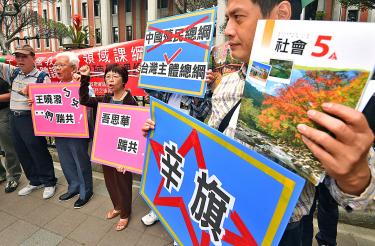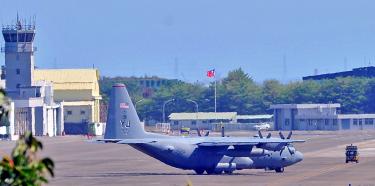In the latest of a series of protests against the high-school curriculum for Chinese language and social science, dozens of civic group representatives yesterday called for Taiwanese to demand the President Ma Ying-jeou (馬英九) administration reverse the policy aimed at “brainwashing” the younger generation.
“Taiwan yes, China no,” protesters shouted outside the Ministry of Education building, which has appealed against the ruling handed down by Taipei High Administration in February that threw into doubt the legitimacy of the ministry’s revisions to the curriculum guidelines in January last year.
The protesters put on a skit to show their dissatisfaction of the weight accorded to the 228 Massacre and the White Terror era in the new version of the curriculum, waving a banner reading: “Taiwanese independence.”
“New curriculum guidelines should be able to stress Taiwan-centered values,” Alliance for Curriculum Guidelines based on Taiwan Subjectivity spokesperson Kuo Yan-lin (郭燕霖) said.
The alliance demanded that Minister of Education Wu Se-hwa (吳思華) push back the date of implementing new curriculum guidelines to June next year and replace “pro-unification academics” on the committee in charge of curriculum review, citing history professor and Cross-Strait Peace and Development Union member Sun Juo-yi (孫若怡).
“There are people who still consider themselves ‘Chinese’ even after living in Taiwan for so long. Less than 3 percent of the nation’s population hold great power that enable them to impose their views on the other 97 percent of Taiwanese,” Taiwan National Party Convener Ted Lau (劉重義) said.
All Taiwanese should fight against the curriculum guidelines attempting to brainwash young people, Lau said.
Alliance of Referendum for Taiwan secretary-general Lee Chuan-hsin (李川信) disputed the ministry’s statement that the revisions made to the guidelines complied with the Republic of China (ROC) Constitution.
The ROC Constitution forced upon Taiwanese by the Chinese Nationalist Party (KMT) regime when it fled to Taiwan in 1949 treated Taiwan as a subordinate under the “one China” framework, Lee said.
“Only by holding a referendum to have the ROC Constitution abolished can problems be resolved,” Lee added.
Taiwan Romanization Association member Wu Li-hui (吳麗慧) said the Ma administration is determined to accomplish its “de-Taiwanization” mission by implementing the new curriculum guidelines and guidelines for other subjects before Ma leaves office in May next year.
The 13 cities and counties governed by the Democratic Progressive Party are considering refusing to adopt the revised curriculum guidelines, while the Taipei City Government, led by Taipei Mayor Ko Wen-je (柯文哲), said that it plans to use the unadjusted curriculum until the ministry resolves the controversy.
Taiwan Independence Reformation Association member Lai Fang-cheng (賴芳徵) called for more students and parents to speak out against the new curriculum guidelines.
Additional reporting by Shih Hsiu-chuan

